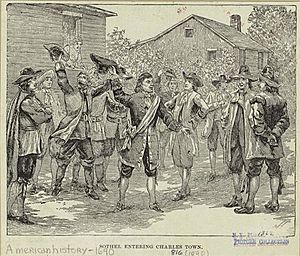Seth Sothel facts for kids
Quick facts for kids
Seth Sothel
|
|
|---|---|
 |
|
| 8th Colonial Governor of Albemarle Sound (North Carolina) | |
| In office 1678–1678 |
|
| Preceded by | Thomas Miller |
| Succeeded by | John Harvey |
| 12th Colonial Governor of Albemarle Sound (North Carolina) | |
| In office 1682–1689 |
|
| Preceded by | John Jenkins |
| Succeeded by | John Gibbs |
| 9th Colonial Governor of South Carolina | |
| In office 1690–1692 |
|
| Preceded by | James Colleton |
| Succeeded by | Philip Ludwell |
| Personal details | |
| Died | 1691 North Carolina |
| Occupation | colonial administrator |
Seth Sothel (also spelled Sothell and Southwell) was an important person in early American history. He was a "Lord Proprietor" and a governor of the Carolina colony. He governed the northern part, which later became North Carolina, in 1678. He also governed the southern part, which became South Carolina, from 1690 to 1692. He passed away around 1694 in North Carolina.
Contents
Seth Sothel's Life Story
Becoming a Colonial Governor
Seth Sothel bought a share of the Carolina colony. This made him a Lord Proprietor. The Lord Proprietors were like owners of the colony. They decided to send Sothel to Albemarle. This was the northern part of Carolina. Sothel was chosen to be its governor. They picked him because he wasn't involved in a big disagreement. This disagreement was called Culpeper's Rebellion.
Captured by Pirates
After leaving England, Sothel's ship was captured. He was taken by pirates from Algeria. These pirates were called Barbary corsairs. While he was held captive, other people governed Albemarle. John Harvey governed first, then John Jenkins. Once Sothel was set free, he finally became governor.
Sothel's Time as Governor
During his time in charge, Sothel did many unfair things. He stopped settlers from trading with Native Americans. But he kept trading for his own benefit. He put people in prison who disagreed with him. This included important people like Thomas Pollock. He also took their land.
Sothel also took merchant ships and their goods. He stole enslaved people, cattle, and farms. He even took money from people who had done wrong. In exchange, he would let them go without punishment.
The Colony Revolts
However, in 1689, the people of the colony had enough. They revolted against Sothel. They captured him and sent him back to England for a trial. As punishment, he was not allowed to hold office in North Carolina again. He was removed from his governor role on December 2, 1689. He was also sent away from the colony for a year.
New Governors and Challenges
After Sothel was removed, the Lords Proprietors chose Philip Ludwell as the new governor. Ludwell sailed from London to take charge. But his authority was challenged by John Gibbs. Gibbs had taken power when Sothel left. Both Ludwell and Gibbs went to London. The Lords Proprietors decided that Gibbs' claim was not valid. So, Ludwell became the official governor.
Sothel's Final Years
By this time, Sothel had gone to South Carolina. He announced himself as governor there in 1690. But he was suspended from this role on November 8, 1691. Sothel then returned to Albemarle. He went back to his Salmon Creek plantation. He died there about a year later, around 1694.
Personal Life
Seth Sothel was a landowner. He was married to Anna Willix. They did not have any children.
 | Toni Morrison |
 | Barack Obama |
 | Martin Luther King Jr. |
 | Ralph Bunche |

